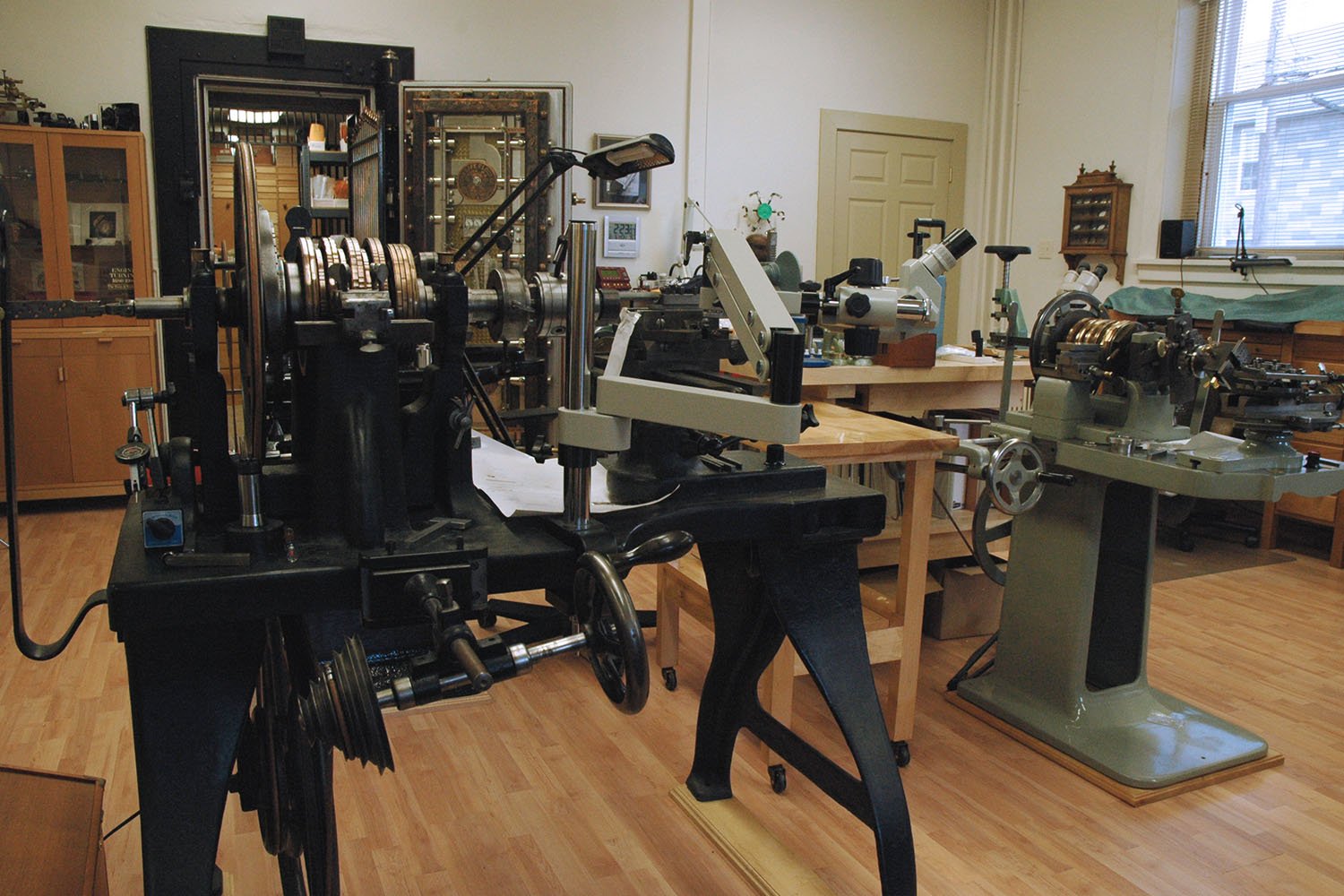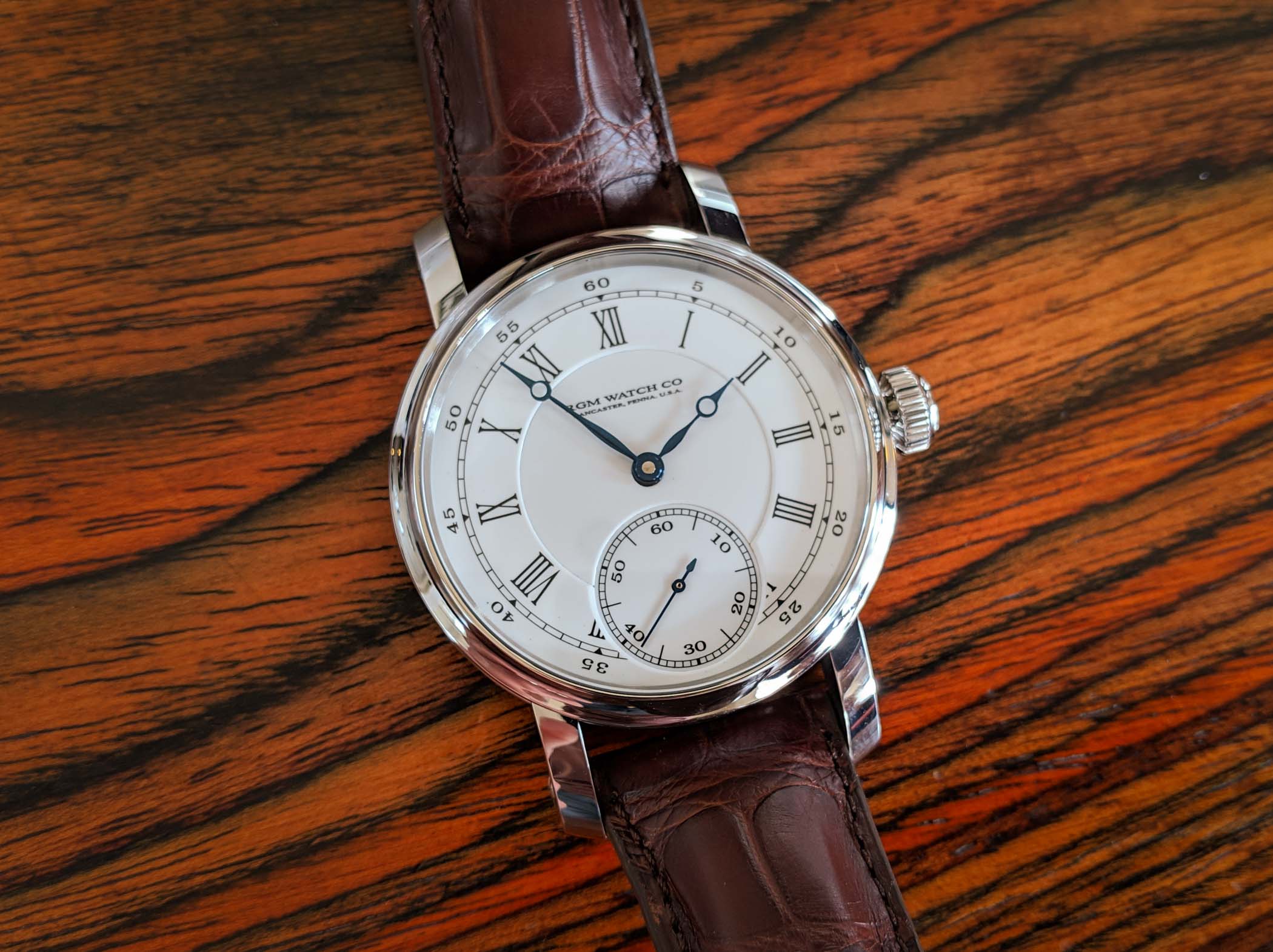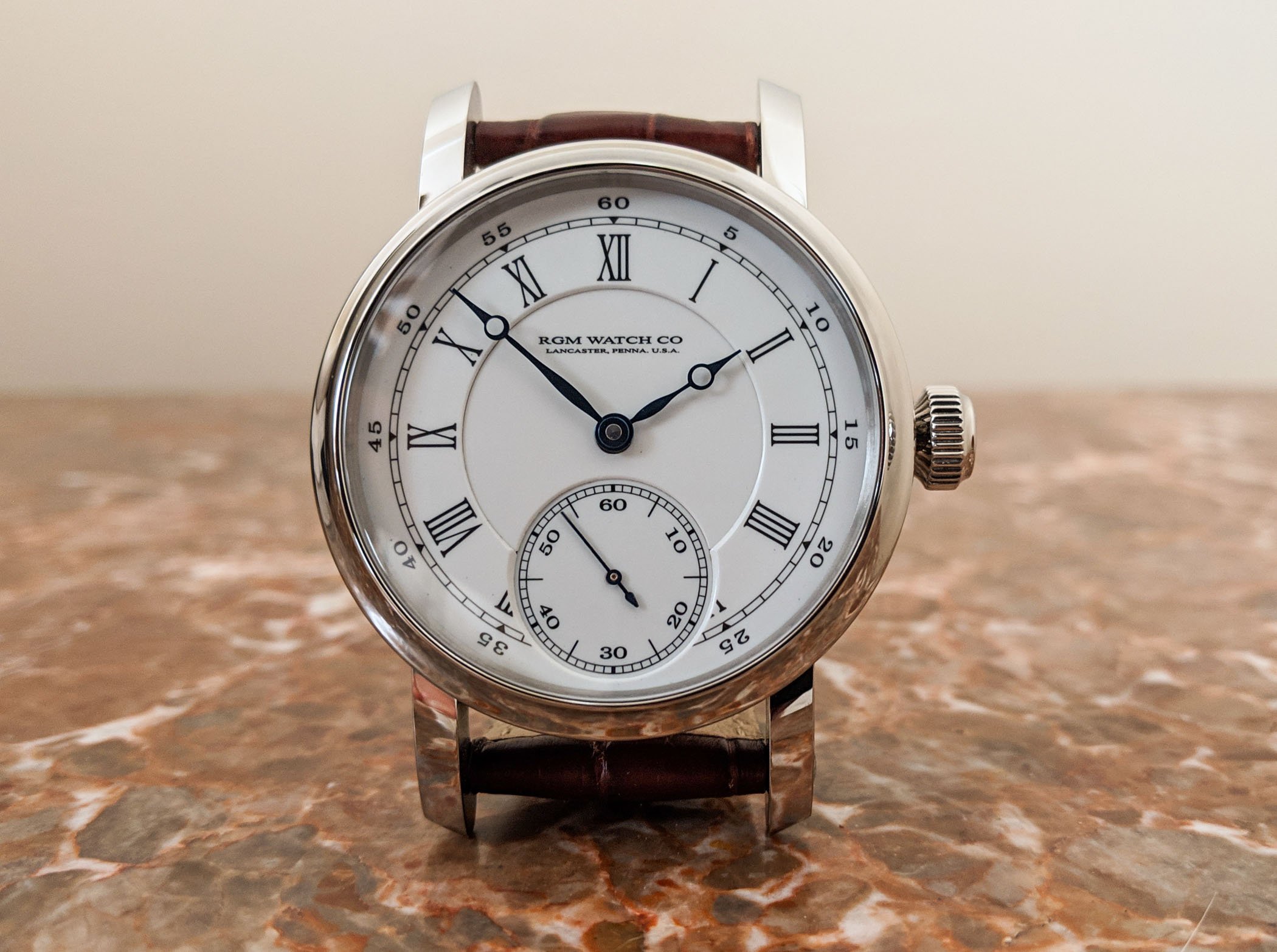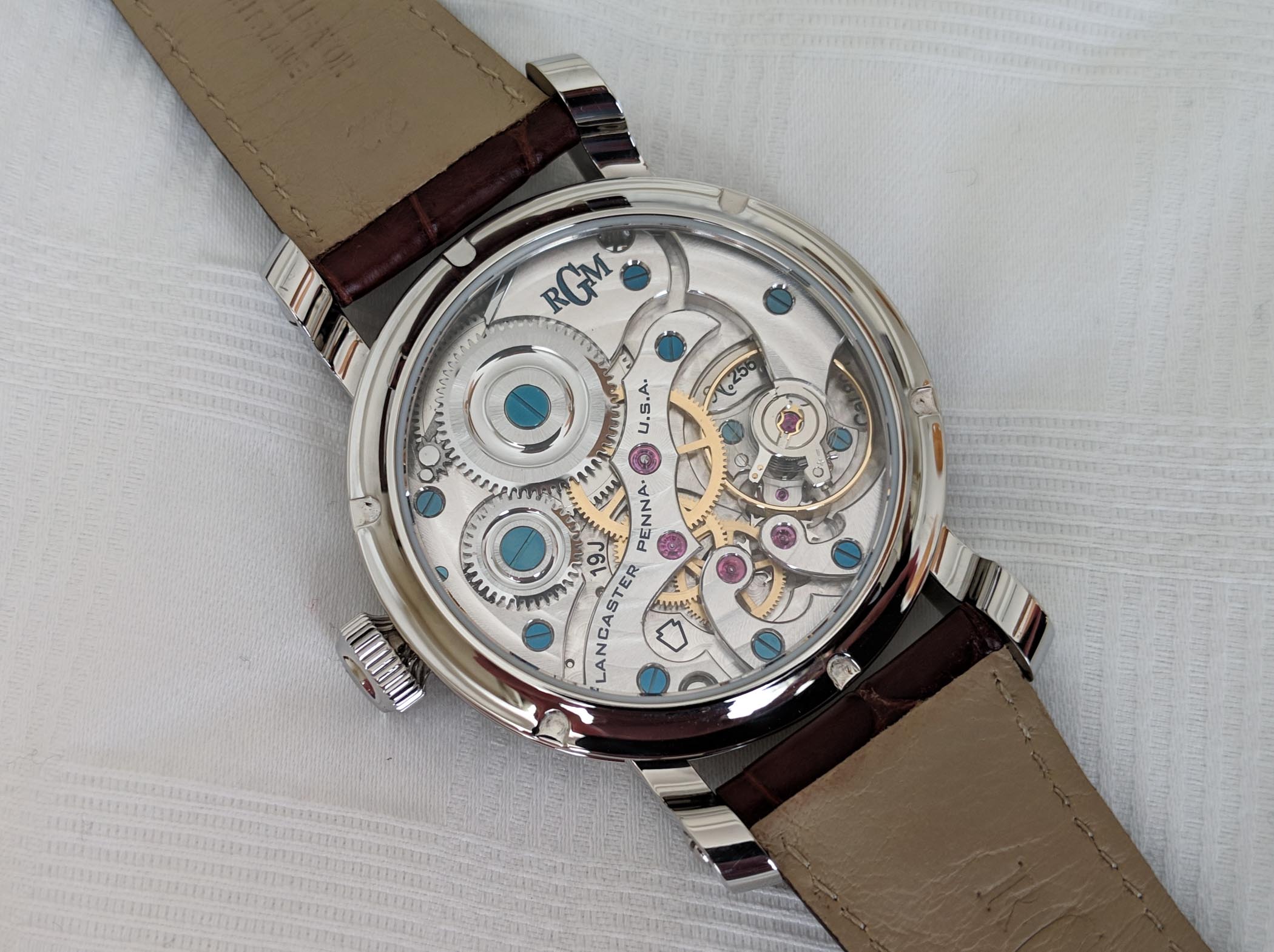RGM Classic Enamel PS-801-CE, The Pride of the “American Made” Watch
A classic and elegant luxury watch that meets with the “American Made” standard - and that is rare enough to be explained!

When you think of great American watch companies, brands like Hamilton and Waltham come to mind. Neither of those are American anymore, with Hamilton ending US production in 1969 after being acquired by the Buren Watch Company in Büren an der Aare, Switzerland. Hamilton ultimately became part of the Swatch Group and remains a popular brand today. Waltham is a bit fragmented, but now principally Waltham International SA, manufacturing luxury Swiss Made watches with the company’s majority owner ironically being an American, Antonio DiBenedetto. Decades ago, both companies manufactured cases and movements, but sadly there are no longer American companies that aren’t importing movements and parts. Well, except for one, which we’ll review today: RGM Watch Co.
RGM Watch Company, founded in 1992 by American watchmaker Roland G. Murphy, is the only American brand that still manufactures cases, dials and movements in-house. You’ve probably heard of “American” brands like Shinola or MVMT (and a large handful of additional microbrands), but all rely on outsourced movements. RGM meets the “American Made” standard in the same way that Swiss watches meet the “Swiss Made” standard, and its high-end watches could even compete with some comparable rival from Switzerland, Germany, Japan and more. The latest piece from RGM is the PS-801-CE Classic Enamel, featuring a superb enamel dial and decorated, in-house RGM Calibre 801. It breaches the five-figure mark and I wouldn’t consider it an accessible piece, but for luxury watch enthusiasts, it’s a very intriguing addition from Mount Joy, Pennsylvania.
BACKGROUND
Who is the man behind the company that bears his name? Roland G. Murphy founded RGM Watch Company in Pennsylvania in 1992, but his watchmaking days started in the early 1980s. In high school, he worked in the cabinet making section of a clock company and his interest in timepieces grew. He went on to study at the Bowman Technical School in Lancaster, PA and travelled to Switzerland in 1986 to study with The Watchmakers of Switzerland Training and Educational Program (WOSTEP).

He later worked in product development for the Hamilton Watch Co. until his passion eventually pushed him to create his own watch brand. Roland has decades of experience restoring watches and his love of both Swiss and American watch history inspires his designs. He combines modern technology with old-world techniques, using antique, hand-operated machinery to preserve traditional craftsmanship such as engine-turned (guilloché) dials. RGM is also one of the rare luxury manufacturers to offer customized watches, from modifying a dial on a production piece to bespoke watches that are designed and produced completely in-house.
Not all of RGM’s watches are entirely American made, with models like the 107-P Pilot (also the oldest production watch in their portfolio) using a decorated Swiss ETA 2892-A2 calibre. This is the company’s most accessibly priced watch and also happens to be the model that sparked my interest in mechanical timepieces back in the 1990s. But it is watches like the Pennsylvania Tourbillon and Caliber 20 with hand-built, in-house movements that really define RGM as a company. From watch restorations, repairs, servicing and in-house production, RGM is truly the last American watch company.
Dial and hands
I usually start this phase of my reviews with the case design, but the enamel dial is significant enough to warrant a first mention. Enamel dials are nothing new, going back to the late 17th century in France and Switzerland, and enamelling, in general, can be found in Ancient Egyptian artefacts. Notwithstanding its ancient roots, producing enamel watch dials is still a very difficult task. It involves fusing particles of glass onto a metal dial at very high temperatures.
To put the difficulty in perspective, high-end watch brands with intricate in-house production and award-winning designs still rely on companies like Donzé Cadrans in Switzerland for enamel dials. And that company has stated that up to 75% of their dials are scrapped due to defects. The term “more art than science” has never been more relevant. In the end, however, the painstaking art of producing enamel dials is worth it as their beautiful, radiant finishes are all but impossible to replicate (although many would argue that well-executed lacquered dials come close).
The dial on the RGM PS-801-CE Classic Enamel uses the Grand Feu (French for “Great Fire”) technique, which uses three layers of enamel to create depth. This makes production even harder as successive layers being re-fired increase the risk of cracking, melting or burning. And this is in a world where even changes in the weather can cause cracks or other blemishes in the enamel during production. Although RGM produces incredibly complex guilloché and other dials in-house, like other luxury brands, it relies on outside artisans to finish the enamel dials. In this case, Roland has a retired friend and expert in Switzerland that produces them in a home workshop (and add that to my bucket list of workshops to visit).
RGM’s dial is a classic white with black Roman numerals on the inside of the top outer layer, surrounded by an outermost minute track with Arabic numerals every five minutes. The inner, central layer has the hour and minute hands, and RGM WATCH CO printed above with LANCASTER, PENNA. U.S.A. underneath. The third, bottom layer at 6 o’clock is the seconds sub-dial with Arabic numerals printed every ten seconds. The dial has a vintage pocket watch aesthetic, but also a hint of a modern vibe. The blued steel Breguet hands continue the vintage look and Keystone hands are also available (as seen on their Caliber 20 models, for example). Intricate yet understated, this time-only dial (and hand combination) is loaded with class, and the brilliance of the enamel must be seen to be fully appreciated.
Case and design
The case on the RGM PS-801-CE Classic Enamel is 42mm in diameter and 12.3mm in height. Substantial, but not overly so. This is RGM’s Pennsylvania series case and American made from polished 316L stainless steel. Unique ridges span both sides and remind me a little of what Chronoswiss or Breguet do with their cases, although RGM’s is entirely unique. They almost appear as architectural columns supporting the two ends. The bezel surrounding the sapphire crystal slopes down and then outward to the case edge, finishing off an interesting yet subtle front.
The lug width is 22mm and the strap is held on via external screws, which I always find appealing. The lugs themselves slope downward with a nice curve at the bottom, highlighting the polished screw heads. The exhibition caseback has a sapphire crystal and showcases the second star of the show – RGM’s in-house 801 calibre. The steel edge surrounding the glass has a similar slope to the front bezel, giving the case a pleasing symmetry. The crown is a bit larger than the norm, which makes winding the manual movement and setting the time a joy, and there’s a Keystone insignia at the end. It doesn’t screw down, but the case is water-resistant to 50 meters. It’s safe from splashes and rain, but here are my two cents – take a watch this nice off your wrist before swimming.
Movement
Although the enamel dial is a highlight of this watch, the in-house RGM 801 calibre makes this a really special piece. As mentioned earlier, this is the only American company currently producing in-house movements and the 801 is truly competitive with Swiss counterparts. It’s manually wound, has 19 jewels, beats at 18,800vph (2.5Hz) with a 44-hour power reserve. A lot of historical consideration went into the design, such as bridges inspired by the Keystone Howard Watch Company’s flagship “Edward Howard” model and the winding click inspired by the Illinois Watch Company’s “Illini” model. The Illinois “Bunn Special” model also inspired the 801’s deep polished winding wheels. Roland G. Murphy’s love of watch history is really emphasized with this movement.
Embellishments include engine-applied circular damaskeening, perlage, anglage (chamfered edges), Geneva stripes and blued screws, with rhodium or gold plating options. There’s also a 7-tooth winding click and wolf’s tooth winding wheels (popular in the 19th century) are also available. For more information on movement finishes, see our article on Finishing in Haute Horlogerie.
LANCASTER PENNA U.S.A. is engraved on a central bridge, highlighting its American production, while RGM is engraved at the top. The 801 calibre was RGM’s first in-house movement, but subsequent calibres include the Pennsylvania Tourbillon Calibre MM 2 and tonneau-shaped Calibre 20 (with a unique motor barrel system to reduce friction). None of these movements are breaking new ground, but the significance of high-end calibres being manufactured in the United States should not be overlooked. RGM states that its movements are 90% American made, meaning a couple of parts like the balance spring and jewels are produced elsewhere. As a small independent company, it wouldn’t be feasible for RGM to attempt to produce its own balance springs or other parts in that 10%.
STRAP
The brown 22mm alligator strap complements the piece well. It’s well padded and comfortable out of the box, without the need for a break-in period. The stainless steel buckle has RGM engraved at the end and the strap simply completes an already classy package. Most RGM alligator straps are made by Stylecraft in Florida, while many come from Jean Rousseau in Paris as well. Straps from Camille Fournet of Paris and Hirsch of Austria are also used for some RGM models. Special colours and sizes are available on request. I surely wouldn’t swap out the one on the Classic Enamel for another (and I’m known to do that). I’d be hard-pressed to find something better.
CONCLUSION
The RGM PS-801-CE Classic Enamel is a well finished, high-end piece by any standard. If it were Swiss made, it’d be on the same field as luxury brands like IWC or Ulysse Nardin. The fact that it’s American made really changes things. The RGM 801 calibre really is a big deal, bringing master watchmaking back to America and keeping the world of horology more diversified. While Switzerland, Germany and Japan often get the most attention, watches like the Classic Enamel prove that talented, motivated artisans can still launch “complete” watch brands in unlikely places.
The brilliant Grand Feu enamel dial shows that RGM has the resources to have speciality items produced by independent entities, while movements like the 801 and Calibre 20 reflect design prowess and master craftsmanship on the same level as Swiss counterparts. Design considerations for the bridges and wheels, reminiscent of movements from another era, show an attention to detail well beyond fancy perlage or Geneva stripes. And with pieces like the Pennsylvania Tourbillon and Calibre 20 models in their portfolio, RGM proves that it is a true master of horological engineering.
RGM’s Classic Enamel sells for USD 11,900 in stainless steel (and USD 24,700 in 18k rose gold). These are hand-built, luxury watches and the prices certainly reflect that. However, for a complex enamel dial and in-house, American made movement housed inside limited production watches, the prices are far from unreasonable. If you’re looking for an alternative to Swiss or German luxury brands, RGM is quite literally your only stop in the United States, but what an outstanding alternative it is. More information can be found at the RGM website.



















23 responses
Good looking but… the remains of seven and five o’clock at the left and right of the seconds dial show some lack of attention to detail!!
like it a lot, but I find the price way too high..
‘American made’
Not really something I value.
Beautiful watch. Informed & intelligent review. I just might buy one.
RGM will always hold a place in my heart for the way they blew off A Blog To Watch when it was the right thing to do and put that fat little egomaniac nobody in his place. The watch at hand is beautiful. Certainly a competitor to the Swiss in this category as well as the Germans and a unique product. Priced right on the mark. American made: the best air-planes, military weapons, space technology, internet tech, computers, etc. — and now, oddly, a player in ancient/new mechanical watches.
How is it American Made if you write the dial comes from Switzerland?
Nah! This is faaar to big and fat
Price is fair, work seems good, but it totally misses the point.
@Spiros Believe me, many many high-end brands do the same design as this one.
The dial is made by RGM themselves, in the US.
Not too keen on the fluted sides of the case but from every other angle it looks really simple but stylish. Nice to hear of someone else making their own movement.
This watch is not a Patek or Lange, yet is priced as though it were. A time only, yellow gold classic Calatrava (Patek) lists for less than $20,000. A time only yellow gold Lange Saxonia lists for under $25,000. I guess you’d be hard pressed to get me believe the quality of the movement workmanship matches either Patek or Lange. This RGM is beautiful, but, in my opinion, substantially overpriced!
Nice looking watch but I have to agree with Spiros about the 5 and 7 o’clock ticks… kind of looks unfinished, or a glitch. But, I understand the need to provide some indication there and the same indicators are used in the same way by other companies. Still not my preference though!
Also, not a fan of the fluting… give me something nice and clean any day of the week! Personal tastes.
LOVE, LOVE the hands… reminds me of Breguet crossed with Voutilainen hands. Simple, clean, and very attractive.
Prefer Voutilainen lugs but, hey, we’re not talking about the same class of watches here!
Seems that many manufacturers use ugly hands on their watches these days. And, the ugliest ones are those with stubby hands that make them look like they were mistakenly cut off at the tips. But, hey, let’s throw it on the watch anyway! (Yes, I realize these types of hands are generally used on divers watches where the need for large luminosity is required.) I, personally, still am not a huge fan though.
All in all, the price point is a fair one for the quality and I would definitely consider purchasing one!
But lugs are too long….
Yes indeed a lot of companies brutally vandalize the hour markers and ignore symmetry but some do it just right!! Because others are alcoholics does not necessary mean we have to be too. Happy new year!!!!
Weiss watches out in California is also making movements in-house.
Great looking watch. I wish I could affod one.
If you closely look at the movement architecture, it looks like ETA/Unitas 6498 to me. Sure, the movement plates are bespoke, but the architecture and wheel set looks like standard ETA to me?
Maybe the same way Nomos base their Alpha & Epsilon movements on the architecture of the Peseux 7001?
For the naysayers on the price, the price point is appropriate for a hand-made movements, porcelain dials, and intricate cases. Frankly, RGM prices should not be compared vs. Lange and Patek who have the economics of scale and watch-sales volume on their side, and who have had the luxury of building on their previous products.
Good job, RGM!
This dial is stunning and the hands compliment it beautifully. The case and lugs though miss the boat. For me, it seems, from a design aesthetic, to be out of place. I do not like the fluted effect on the outside of the case and the lugs seem to large and overpowering, overweighted in proportion to the case itself. It would be nice to see this case in a sub 40 mm diameter. It is a little too large for most wrists.
The fluted sides are a no, no. I live in a desert country where dust is always a problem. This watch would be a real problem.
I find the reference to Patek interesting, as I own a 5146J, I also own an Omega Planet Ocean, Breitling superocean heritage ii, several Tags (one I have had for ~40 years) and I happen to have a Citizen Eco Drive. I just ordered the RGM PS-801-EE with the Motor Barrel with a significant custom engraving on the back case edge. I find watches to be extremely personal and I only buy the ones that really hit me right from the get go. I thought the Citizen was sharp and for $900, it was a fun buy. I also loved the Patek and for $42K (without tax), it was an awesome purchase. I love every single one in between as well. I cannot wait to get the RGM, it’s about 6 – 8 months until it will be completed. Also of interest, RGM uses Guillochè, as does Patek and several other of the top watchmakers on the planet. Patek had to start somewhere, 1839, and has had 180 years to build what might be considered the most prestigious watch manufacturer in the world. That being said, that’s 121 years before I was born, and maybe we are witnessing the birth of a new legend in Horology. Maybe.. Anyhow, I’m in and will truly love the watch for its beauty and for the love that went into making this piece. It will never be compared to my Patek, but sit next to it with its own beauty. (well, the Patek needs to be in a winder, so not exactly directly next to it, but REALLY close)
Many of the comments below completely miss the point.It is very difficult to build your own watch in the United States without all the supporting industry. Many watch companies do not make their own movements and
Many have recently started making their own movements. Case in point Rolex Just started making in-house movements in 2004. So to do this in the US for the first time since 1969 is incredibly expensive and difficult. Also if you see the watches in person, they were beautiful and beautifully decorated. Secondly you won’t find someone as responsive as Roland Murphy to customers and their wishes. He will gladly customize things for you as well. They’re not for everyone but to dismiss them the way some of these people writing in to you that really have no knowledge of the thing is very unfair